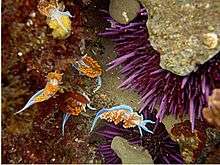Hermissenda opalescens
| Hermissenda opalescens | |
|---|---|
 | |
| Closeup of Hermissenda opalescens off Monterey, California | |
| Scientific classification | |
| Kingdom: | Animalia |
| Phylum: | Mollusca |
| Class: | Gastropoda |
| (unranked): | clade Heterobranchia clade Euthyneura |
| Superfamily: | Aeolidioidea |
| Family: | Facelinidae |
| Genus: | Hermissenda |
| Species: | H. opalescens |
| Binomial name | |
| Hermissenda opalescens Cooper, 1863[1] | |
Hermissenda opalescens is a species of brightly coloured sea slug or nudibranch, a marine gastropod mollusc in the family Facelinidae.[2]
This species is commonly known as the "opalescent sea slug."
Distribution
This nudibranch was described from San Diego, California, United States.[1] It has been reported from Northern California, to Punta Eugenia, Mexico. Its distribution overlaps with Hermissenda crassicornis in Northern California and this latter species is found north to Alaska.[2] These two species were routinely treated as a single species during the last 90 years.[3]
The species has also been observed in Bahia de los Angeles, Gulf of California.
Habitat

This sea slug is found in various habitats, including the intertidal zone of rocky shores, but also in bays and estuaries.
Description
The species grows to be about 50 mm, or about 2 inches.
This slug has been treated as a model organism and used in studies into classical conditioning, memory consolidation and associative learning, the structure of neural circuits and neural physiology. It has also been used to investigate ultrastructure and anatomy, larval and reproductive ecology, behavioral ecology and pharmacology and toxicology including studies into Beta thymosins. Unfortunately these studies did not differentiate between the three species of Hermissenda.[2]
Life habits
This nudibranch feeds on hydroids and other marine organisms such as ascidians and sea anemones. It sometimes attacks other nudibranchs, and will eat smaller specimens of its own species. It is host to the ectoparasites Halicyclops thysanotus Wilson C.B., 1935 and Hemicyclops thysanotus Wilson C.B., 1935.
References
- 1 2 Cooper, James Graham. 1863. [for 1862]. Some new genera and species of California Mollusca. Proceedings of the California Academy of Natural Sciences 2:202-207.
- 1 2 3 Lindsay, T. & Valdés, Á. (2016) The Model Organism Hermissenda crassicornis (Gastropoda: Heterobranchia) Is a Species Complex. PLoS ONE 11(4): e0154265.
- ↑ O'Donoghue, C. H. 1922. Notes on the taxonomy of nudibranchiate Mollusca from the Pacific coast of North America. I. On the identification of Cavolina (i.e. Hermissenda) crassicornis of Eschscholtz. Nautilus 35(3):74-77.